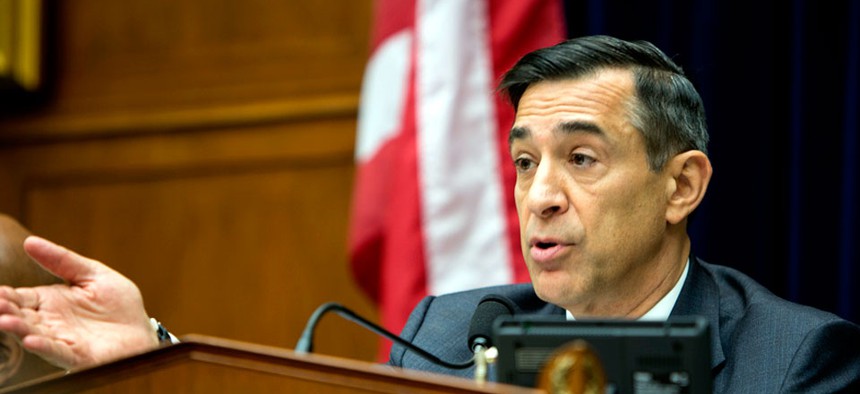
Rep. Darrell Issa, R-Calif. House subcommittee on Oversight and Reform
Largest Obstacle to Clean Federal Books Is the Pentagon, GAO Chief Says
No one knows exactly how much money the government wastes.
One of the key challenges to curbing wasteful government spending, lawmakers say, is that no one knows exactly how much is being wasted.
An estimated $107.7 billion made in improper payments last year, for example, does not include faulty payments by the agency with the most problem-plagued finances -- the Defense Department, Comptroller General Gene Dodaro said Wednesday at a House hearing on agencies’ difficulties tracking and documenting spending.
Answering questions on topics ranging from intergovernmental communication to performance measures to use of information technology in implementing the Affordable Care Act, Dodaro summarized recent Government Accountabilty Office critiques of agency financial statements and called for heightened congressional oversight as the best single way to help clean them up.
Oversight and Government Reform Committee Chairman Darrell Issa, R-Calif., called the hearing because “President Obama is asking the American people to trust government and give them more authority over their money,” he said. “But it is getting harder to get good execution of existing accountability, and the government must begin performing basic math better. The “looming Affordable Care Act,” with its links to data systems run by the Internal Revenue Service, risks having patients “find their health records on the Internet,” Issa said.
Issa stressed that the government’s auditability problems cross administrations and that the search for solutions to improving performance is bipartisan.
Recent GAO reports have presented a mixed picture of governmentwide progress on financial auditability and implementation of the 2010 Government Performance and Results Modernization Act. “Three long-standing major impediments prevented GAO from expressing an opinion on the government’s 2012 accrual-based consolidated financial statements,” Dodaro said. They are “serious financial management problems at the Department of Defense; the federal government’s inability to adequately account for and reconcile intragovernmental activity and balances between federal entities, and the federal government’s ineffective process for preparing the consolidated financial statements.”
The executive branch’s current estimate of improper payments, he noted, does not include the Defense Department, student loans or temporary assistance for needy families. He added that four agencies did not submit estimates of improper payments and six others supplied data of insufficient quality.
The Pentagon, which accounts for half of federal discretionary spending, has been on GAO’s high-risk list since the 1990s because “it operated for years without any requirement to produce auditable statements,” Dodaro said, noting that a third of the 30 areas on the high-risk list involve Defense. “The commitment then was not as strong as it is today,” and the problems among the department’s far-flung components need to be solved locally, he said.
Progress on the performance act implementation is visible, he said, citing agency setting of goals and appointment of performance officers. “But agencies need more complete performance measures, in grants and contracts” for example, he added. “Meaningful improvement will not occur without vigorous leadership by the executive branch and rigorous oversight by Congress,” Dodoro said. He recommended “not just one hearing a year, but sustained attention,” with more joint hearings, hearings across chambers, with milestones and goals.
Dodaro agreed with Issa’s assertion that agencies would benefit from uniform data format standards called for under the DATA Act, which the House passed last Congress but which died in the Senate. And on the health care law, he agreed that “computer security is a governmentwide high risk,” expressing concern that Health and Human Services Department employees preparing the state health insurance exchanges to go online by Oct. 1 “might take short cuts to do the exchanges on time.”
Rep. John Mica, R-Fla., asked whether the Office of Management and Budget should begin withholding funds from agencies that don’t supply good financial information. “Only 37 percent of managers in your survey conducted performance reviews of programs,” he noted. “It seems these agencies and government in general are spinning out of control, so how can we get their attention?”
Dodara said giving OMB such authority would be “a good place to start, to change the incentives because now there is no evidence to demonstrate program effectiveness.”
Rep. Stephen Lynch, D-Mass., expressed frustration that the National Security Agency “can tell us how many times Aunt Margaret has called Aunt Matilda, but you can’t get the DoD to do an audit--it’s a black hole.” Lynch also expressed regret that “the degree of oversight by Congress depends on blameworthiness as we lurch from scandal to scandal based on ability to embarrass the other party. This issue has been fumbled by administrations over time,” he said. “But this work is meaningful, even though it doesn’t get headlines. If we get it right , it will help us across the board.”
Rep. Gerry Connolly, D-Va., agreed that “this is not a sexy topic, but it has real promise,” he said, touting the Federal Information Technology Acquisition Reform Act he introduced with Issa to restructure agency chief information officers.
“I wouldn’t say our legislation is not attractive,” Issa joked. “It is close to being the swimsuit issue.”







